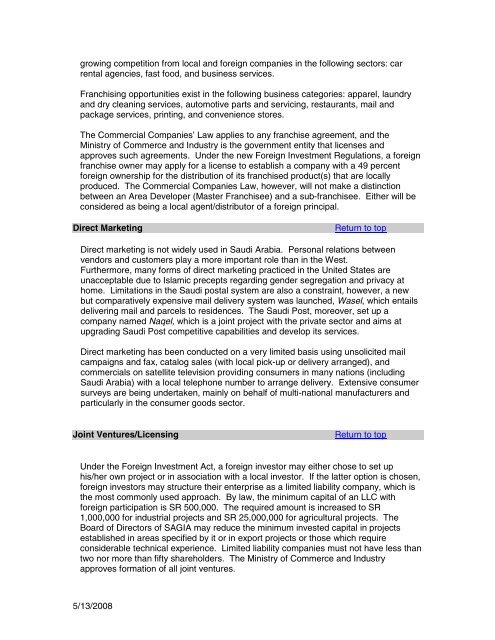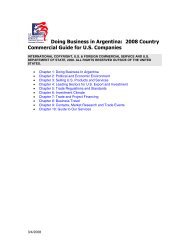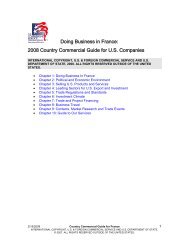Doing Business In Saudi Arabia - Bna
Doing Business In Saudi Arabia - Bna
Doing Business In Saudi Arabia - Bna
Create successful ePaper yourself
Turn your PDF publications into a flip-book with our unique Google optimized e-Paper software.
growing competition from local and foreign companies in the following sectors: car<br />
rental agencies, fast food, and business services.<br />
Franchising opportunities exist in the following business categories: apparel, laundry<br />
and dry cleaning services, automotive parts and servicing, restaurants, mail and<br />
package services, printing, and convenience stores.<br />
The Commercial Companies’ Law applies to any franchise agreement, and the<br />
Ministry of Commerce and <strong>In</strong>dustry is the government entity that licenses and<br />
approves such agreements. Under the new Foreign <strong>In</strong>vestment Regulations, a foreign<br />
franchise owner may apply for a license to establish a company with a 49 percent<br />
foreign ownership for the distribution of its franchised product(s) that are locally<br />
produced. The Commercial Companies Law, however, will not make a distinction<br />
between an Area Developer (Master Franchisee) and a sub-franchisee. Either will be<br />
considered as being a local agent/distributor of a foreign principal.<br />
Direct Marketing Return to top<br />
Direct marketing is not widely used in <strong>Saudi</strong> <strong>Arabia</strong>. Personal relations between<br />
vendors and customers play a more important role than in the West.<br />
Furthermore, many forms of direct marketing practiced in the United States are<br />
unacceptable due to Islamic precepts regarding gender segregation and privacy at<br />
home. Limitations in the <strong>Saudi</strong> postal system are also a constraint, however, a new<br />
but comparatively expensive mail delivery system was launched, Wasel, which entails<br />
delivering mail and parcels to residences. The <strong>Saudi</strong> Post, moreover, set up a<br />
company named Naqel, which is a joint project with the private sector and aims at<br />
upgrading <strong>Saudi</strong> Post competitive capabilities and develop its services.<br />
Direct marketing has been conducted on a very limited basis using unsolicited mail<br />
campaigns and fax, catalog sales (with local pick-up or delivery arranged), and<br />
commercials on satellite television providing consumers in many nations (including<br />
<strong>Saudi</strong> <strong>Arabia</strong>) with a local telephone number to arrange delivery. Extensive consumer<br />
surveys are being undertaken, mainly on behalf of multi-national manufacturers and<br />
particularly in the consumer goods sector.<br />
Joint Ventures/Licensing Return to top<br />
Under the Foreign <strong>In</strong>vestment Act, a foreign investor may either chose to set up<br />
his/her own project or in association with a local investor. If the latter option is chosen,<br />
foreign investors may structure their enterprise as a limited liability company, which is<br />
the most commonly used approach. By law, the minimum capital of an LLC with<br />
foreign participation is SR 500,000. The required amount is increased to SR<br />
1,000,000 for industrial projects and SR 25,000,000 for agricultural projects. The<br />
Board of Directors of SAGIA may reduce the minimum invested capital in projects<br />
established in areas specified by it or in export projects or those which require<br />
considerable technical experience. Limited liability companies must not have less than<br />
two nor more than fifty shareholders. The Ministry of Commerce and <strong>In</strong>dustry<br />
approves formation of all joint ventures.<br />
5/13/2008












